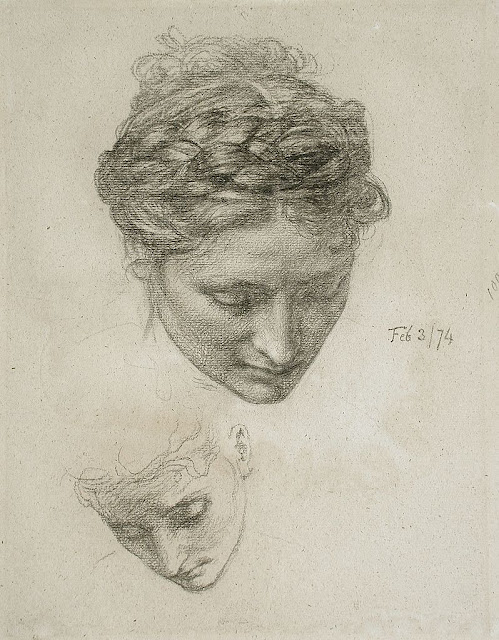 |
| Adolphe-Gustave Binet Construction of the Eiffel Tower 1888 drawing, watercolor Morgan Library, New York |
 |
| Jean-Baptiste-Camille Corot Young women of Sparta ca. 1868-70 oil on canvas Brooklyn Museum |
 |
| Gustave Courbet The Wave ca. 1870 oil on canvas National Museum of Western Art, Tokyo |
 |
| Thomas Wilmer Dewing Hymen ca. 1884-86 oil on panel Cincinnati Art Museum |
 |
| William Holman Hunt A Porter to the Hogarth Club 1858 drawing Birmingham Museum and Art Gallery |
 |
| Max Klinger Woman in diaphanous garment ca. 1875-80 drawing British Museum |
 |
| Edwin Landseer Portrait of Mr. Van Amburgh as he appeared with his animals at the London theatres 1846-47 oil on canvas Yale Center for British Art |
"It was not worth while trying to impress a man of that sort. If the world had been full of such men, life would have probably appeared to Jukes an unentertaining and unprofitable business. He was not alone in his opinion. The sea itself, as if sharing Mr. Jukes's good-natured forbearance, had never put itself out to startle the silent man, who seldom looked up, and wandered innocently over the waters with the only visible purpose of getting food, raiment, and house-room for three people ashore. Dirty weather he had known, of course. He had been made wet, uncomfortable, tired in the usual way, felt at the time and presently forgotten. So that upon the whole he had been justified in reporting fine weather at home. But he had never been given a glimpse of immeasurable strength and of immoderate wrath, the wrath that passes exhausted but never appeased – the wrath and fury of the passionate sea. He knew it existed, as we know that crime and abominations exist; he had heard of it as a peaceable citizen in a town hears of battles, famines, and floods, and yet knows nothing of what these things mean – though, indeed, he may have been mixed up in a street row, have gone without his dinner once, or been soaked to the skin in a shower. Captain MacWhirr had sailed over the surface of the oceans as some men go skimming over the years of existence to sink gently into a placid grave, ignorant of life to the last, without ever having been made to see all it may contain of perfidy, of violence, and of terror. There are on sea and land such men thus fortunate – or thus disdained by destiny or by the sea."
– from Typhoon by Joseph Conrad
 |
| Frederic Leighton Study of a woman's head for the painting 'A noble lady of Venice' ca. 1865 drawing Art Gallery of South Australia, Adelaide |
 |
| Albert Joseph Moore Canaries ca. 1875-80 oil on canvas Birmingham Museum and Art Gallery |
 |
| Edward Poynter Study of two heads 1874 drawing Los Angeles County Museum of Art |
 |
| Christoffer Wilhelm Eckersberg Three Spartan boys practising archery 1812 oil on canvas Hirschsprung Collection, Copenhagen |
 |
| Christoffer Wilhelm Eckersberg Via Sacra, Rome 1814 oil on canvas Ny Carlsberg Glyptotek, Copenhagen |
 |
| Christoffer Wilhelm Eckersberg Interior of the Church of San Lorenzo fuori le Mura, Rome 1815 oil on canvas Hirschsprung Collection, Copenhagen |
 |
| Christoffer Wilhelm Eckersberg Colosseum, Rome 1815-16 oil on canvas Hirschsprung Collection, Copenhagen |
"The old man warned us in his gentle and inflexible way that it was part of our duty to save for the underwriters as much as we could of the ship's gear. Accordingly we went to work aft, while she blazed forward to give us plenty of light. We lugged out a lot of rubbish. What didn't we save? An old barometer fixed with an absurd quantity of screws nearly cost me my life: a sudden rush of smoke came upon me, and I just got away in time. There were various stores, bolts of canvas, coils of rope; the poop looked like a marine bazaar, and the boats were lumbered to the gunwales. One would have thought the old man wanted to take as much as he could of his first command with him. He was very, very quiet, but off his balance evidently. Would you believe it? He wanted to take a length of old stream-cable and a kedge-anchor with him in the long boat. We said, "Ay, ay, sir," deferentially, and on the quiet let the things slip overboard. The heavy medicine-chest went that way, two bags of green coffee, tins of paint – fancy, paint! – a whole lot of things. Then I was ordered with two hands into the boats to make a stowage and get them ready against the time it would be proper for us to leave the ship."
– from Youth by Joseph Conrad